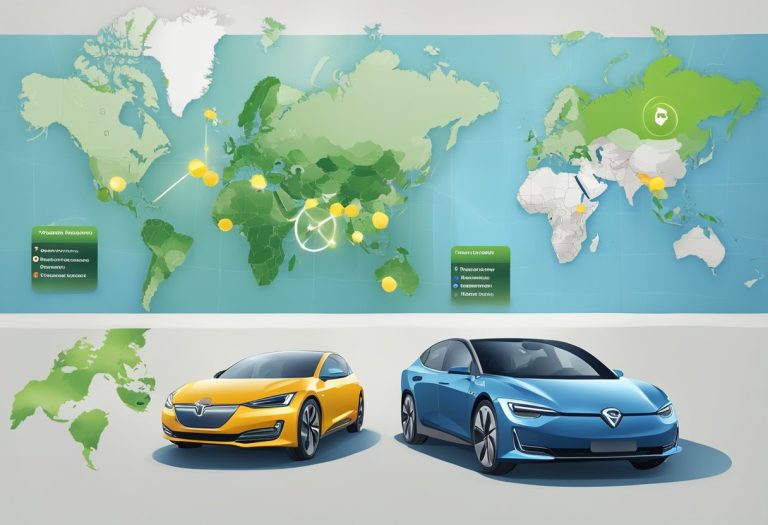
Electric cars are becoming increasingly popular as people look for more environmentally friendly options. However, many people are unsure about how the maintenance of an electric car works. The good news is that electric cars are generally easier to maintain than traditional gas-powered cars.
One of the biggest advantages of electric cars is that they are largely maintenance-free. Unlike gas-powered cars, electric cars don’t have an engine with many moving parts that need regular maintenance. This means that electric cars require less regular maintenance and are generally more reliable than gas-powered cars. However, there are still certain things that need to be checked and maintained regularly to ensure that the car is running smoothly.
Regular maintenance tasks for electric cars include checking the tires, brakes, and suspension, as well as ensuring that the battery is charged and functioning properly. Many of these tasks can be performed by the car owner themselves, while others may require a trip to a certified electric car mechanic. In the following sections, we will explore in more detail how the maintenance of an electric car works and what steps you can take to keep your electric car running smoothly.
Electric vehicles (EVs) require maintenance to ensure their safety, performance, and longevity. Below are some key areas to consider when it comes to maintaining an electric vehicle.
The battery pack is a crucial component of an EV, and its maintenance is essential to ensure optimal performance and longevity. Regular maintenance of the battery pack includes checking the battery coolant level, ensuring proper charging, and monitoring battery life and degradation. It is also important to follow the manufacturer’s recommended maintenance schedule for the battery pack.
EVs use regenerative braking, which means that the electric motor helps slow the vehicle down, reducing wear on the brake pads and rotors. However, the brake system still requires maintenance, including checking the brake fluid level and replacing it as necessary. It is also important to monitor the brake pads and rotors for wear and replace them as needed.
Proper tire and suspension maintenance is crucial for the safety and performance of an EV. Regular maintenance includes checking tire pressure and adjusting it as necessary, rotating the tires every 7,500 miles, and monitoring tire wear and tread depth. In addition, the suspension system should be inspected regularly for damage and wear and repaired or replaced as necessary.
Overall, regular maintenance of an EV is essential for optimal performance, safety, and longevity. It is important to follow the manufacturer’s recommended maintenance schedule and to address any issues promptly to prevent further damage and costly repairs. Additionally, it is worth checking the warranty to understand what is covered and what is not.
Regular service and periodic checks are essential to maintain the performance and longevity of an electric car. The owner’s manual will provide detailed information on the recommended service intervals for each component of the vehicle. It is important to follow these guidelines to ensure the car remains in good condition.
Electric cars require less maintenance than traditional vehicles, but they still need regular fluid changes and filter replacements. The dealership or service center can perform these tasks, or EV owners can do them at home with the right tools and knowledge.
The coolant in an electric car helps regulate the temperature of the battery and electric motor. It is important to check the coolant level regularly and replace it as needed. The cabin air filter and windshield washer fluid should also be checked and replaced as necessary.
The air conditioning system in an electric car requires periodic maintenance, including checking the refrigerant level and replacing the cabin air filter. EV owners should have the air conditioning system serviced by a qualified technician to ensure it is working properly.
Electric cars have many software-controlled components that require periodic updates to ensure they are working correctly. These updates can be done at the dealership or by the owner using software provided by the manufacturer.
In addition to software updates, electric cars have many moving parts that require periodic maintenance. This includes the electric motor, lights, and windshield wipers. Regular service can help prevent problems and extend the life of these components.
Overall, routine checks and service intervals are essential for maintaining an electric car. By following the manufacturer’s guidelines and having the car serviced regularly, EV owners can ensure their vehicle remains in good condition and performs at its best.
Like any other vehicle, electric cars require regular maintenance to ensure optimal performance. The components that require regular servicing in an electric vehicle include the brakes, tires, suspension, and steering system. Additionally, the battery and electric motor should be inspected periodically to ensure optimal performance.
Electric vehicles generally require less maintenance than gasoline vehicles, as they have fewer moving parts and fluids to replace. However, the cost of maintenance for electric vehicles may be higher due to the specialized training and equipment required to service them.
The frequency of professional servicing for an electric vehicle depends on the manufacturer’s recommendations and the vehicle’s usage. In general, electric vehicles should undergo professional servicing at least once a year or every 10,000-15,000 miles.
Common issues faced by electric vehicles that require maintenance include battery degradation, charging system malfunctions, and electric motor failures. Additionally, issues with the brakes, tires, suspension, and steering system can also occur and require maintenance.
Standard mechanics may not have the specialized training and equipment required to service electric vehicles. It is recommended to seek out a mechanic with experience and training in electric vehicle maintenance to ensure optimal performance and safety.
The lifespan and replacement cost of an electric vehicle battery vary depending on the manufacturer and model. In general, electric vehicle batteries have a lifespan of 8-10 years and can cost several thousand dollars to replace. However, some manufacturers offer warranties and replacement programs for their batteries.